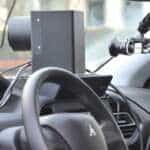There has been a significant increase in new mobile radars mounted on cars patrolling in France. Whereas that news might not seem unusual, the clue to the peculiarity is in the phrase, “mounted on cars patrolling in France”, because these detection devices are not mounted on police patrol vehicles, nor are the police even involved, but rather they are on private vehicles the owners of which are making money by capturing speeding drivers.
The concept is not new however, in France, hundreds of drivers have been working in this way for years with exceptional results from the point of view of the police, because as the French authorities recognise, it is easier for them to go unnoticed, which allows them to detect violations easily.
To facilitate the private capturers, the French traffic department has hired four companies that are in charge of selecting the appropriate drivers for this task, since logically not just anyone will do. They must be good drivers who have a minimum of 10 driving licence points out of a maximum of 12, which is what is allowed in the country.
These types of drivers must spend all day patrolling the roads, or at least for as many hours as possible, since they do not charge per penalty, which would be illegal, but rather per kilometre travelled in this patrol work. In this case, drivers bill around 1,500 euro per month for a job that for the most part just requires them to drive and keep moving.
In Spain the mechanism is not exactly like that, but the truth is that as demonstrated by what happened in the town of Cazalegas, Toledo, there are individuals and companies that make a living from it.
In this case, it is not the DGT that outsources this service, but it is the city councils that do it. Let us remember that the town councils have transferred control of traffic on their streets as well as the sanctioning capacity.
What they do is hire the services of companies that are dedicated to controlling traffic using cameras and installing radars. The town councils limit themselves to outsourcing the service and then signing the sanctions imposed by these companies to give them legal support, companies that also have a legal department in charge of collecting the fines by executive means.
In this case they usually go for a 50% commission, so everything is profit for the mayor’s office. The problem in Cazalegas is that the mobile radar was being controlled by an individual from inside his car, something that is specifically prohibited, because if there is a mobile radar of these characteristics, it must be handled by an authority agent.
This represents a defect in form that could invalidate all sanctions imposed by that equipment during the hours in which it was in operation. If that same equipment had been autonomous (a fixed camera with radar) and had the relevant controls from the Spanish metrology centre, the fines would be perfectly legal.





